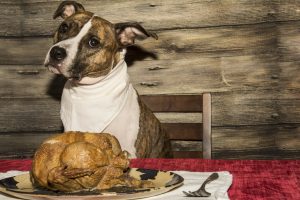
As Thanksgiving approaches, many pet owners will be adding their pets to the list of things they are grateful for. Pets provide us with so much joy, love, and companionship, that it’s understandable to want to include them in our important family events, including sharing the big Thanksgiving meal.
When we think about sharing table scraps with our pets, foods that are potential pet toxins may come to mind. However, even small amounts of non-toxic foods can trigger a dangerous condition called pancreatitis in pets.
Pancreatitis in Pets
The pancreas is a large organ located just behind the stomach and the entrance to the small intestine. A healthy pancreas has a variety of important functions, including the secretion of insulin and digestive enzymes. Pancreatitis in pets occurs when the pancreas becomes irritated and inflamed, triggering a host of digestive problems, as well as negatively impacting the surrounding organs.
Symptoms of pet pancreatitis include:
Vomiting
Diarrhea
Severe abdominal pain
Lethargy
Dehydration
Overall weakness
Depression
In mild cases, pancreatitis may clear up on its own or with good outpatient treatment. However, some pets will require hospitalization to treat dehydration, pain, and potential infections associated with the condition.
Cutting the Fat
The exact causes of pancreatitis in pets aren’t known, but we are aware that feeding pets overly rich and fatty foods can play a role. Although our pets covet the delicious tidbits commonly found on the Thanksgiving table, such as poultry skin, bacon, gravy, or buttery side dishes, these types of foods can be a threat to their health.
If you just can’t resist those puppy dog (or kitty cat) eyes, or just want your pet to share in the celebration, try offering him or her a bite of an unbuttered and unsalted vegetable side dish, such as green beans or mashed potatoes. Many pets love pumpkin, and a scoop of canned pumpkin can make a wonderful, low-fat “dessert” for dogs and cats alike.
Never feed your fur friend onions, garlic, chocolate, or anything with the artificial sweetener Xylitol included, as these items are toxic for pets.
Even the most well-behaved pet is known to sneak a tidbit when no one is looking, so to avoid a holiday emergency make sure to put leftovers away immediately and keep trash cans covered at all times.
Staying on Track
Ensuring that your pet understands and follows important commands, such as “leave it”, will go a long way toward avoiding a dangerous situation. Consider enrolling your pet in an obedience class to brush up on the basics ahead of time.
Don’t hesitate to contact your team at The Pets Place Animal Hospital with any questions or concerns you may have!










